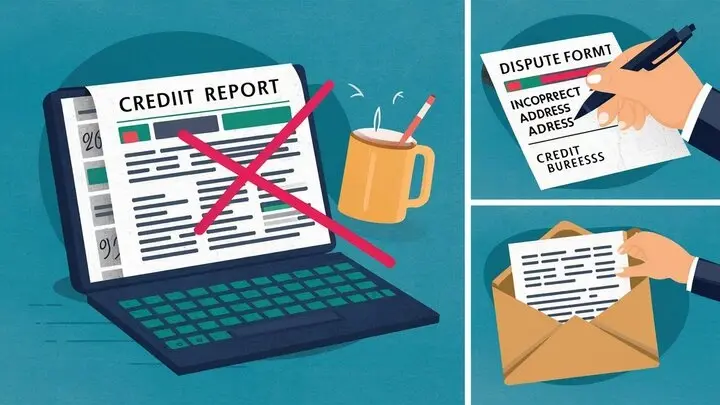-
Posted on: 28 Jun 2024

-
In particular, the wrong address, which may be indicated in the credit report, can also lead to various problems when applying for loans, credit cards, apartments, etc. Unfortunately, landlords or any other persons who offer credit may consider an inaccurate address as something negative, fearing that one is a fraudster. Luckily, some steps can be followed in disputing wrong addresses in the credit report as indicated below.
Get Your Free Credit Report Today
The first thing you must do is obtain copies of your credit reports from the three main credit reporting agencies: Equifax, Experian, and TransUnion. The only way to obtain these reports is from the website www.annualcreditreport.com and it is free if you request it once a year. While working on the analysis, focus on the personal information section of every report, such as current and prior addresses. A word of caution: Take note of any addresses that seem unfamiliar or contain inaccuracies. Also, verify the details addressed for each active and inactive credit account that you have. Incorrect input here also affects the application of credit in the right manner and at the right place.
Gather Supporting Documentation
To contest the information the credit bureaus have given out, make sure to compile relevant documents to support your statement. The evidence showing your correct address history may include:
- Documents that are copies of utility bills, bank statements, or government mail that have been forwarded to your current and previous correct addresses
- Having signed rental or lease agreements with your name and the proper address(es) on the document(s).
- A current, unexpired government-issued photo identification card with your correct address, such as a driver’s license.
- Voter registration cards sent to your right address
- For insurance documents to be dispatched they need to be sent to the right address of your home.Including copies of such documents with the dispute letter assures the credit bureau that you have never resided at the addresses in question.
Writing the Dispute Letters to Each Credit Bureau
DRAFT formal dispute letters to Equifax, Experian, and TransUnion. Attach your valid copy of your passport, visa, and I-94 with your complete name, birth date, SSN, and current residential address. Ensure that your dispute letter is short, contains facts, and is uncomplicated.
State calmly that you are requesting the credit reporting agency to remove an incorrect address that has been posted on the credit report you have been provided with. State whether and to what specific address(es) the name is wrong. Refer to each tradeline on all the accounts if possible, which displays the wrong address. Give your precise address history and include copies of the documents that are attached to the letter. Demand that the credit bureau investigates the matter and/or ask them to report the false address as permanently deleted from your credit report.
Last of all, ask the credit bureau to send your new report showing the corrections consistent with the current investigation of the dispute to your current mailing address. Do not forget to enclose your signature and date at the end of your letter and then, either physically post or electronically send the letter to the appropriate department of each of the bureaus. It is advisable to retain copies of your files, and records, for instance, receipts that indicate that letters were posted.
If you have any of the documents listed below, you should forward them to the credit bureaus.
In addition to the dispute letters that you type and write effectively, you should also enclose clear photocopies of the documents in support of your case. Such proof can be submitted in original form or photocopies, but the credit bureaus can most easily match the proof to your file with copies. Provide only such documents necessary to support the correct address history and include only the addresses in question, as well as the current ones. Pro forma papers may be voluminous and overly detailed, which may be counterproductive to the investigators or obscure the specific issues.
After a few weeks, you should check up on your disagreements to see whether any new evidence has emerged.
It is only wise to expect that it may take 30 to 45 days before the bureaus can conduct thorough investigations and remove the erroneous addresses on the credit reports. In the same regard, ensure that you check your mailbox frequently so that you can see the responses we receive. If the disputes that you make are successful and the bureaus agree to make the amendments, you will be furnished with new credit reports indicating the changes.
However, if, after investigation, the credit bureau finds that the particular address was indeed incorrect, but has not been changed, it has to provide notice as to why. Such reasons could be the failure to properly corroborate the correct addresses you have provided in the past or the inability to match the disputed address with the public records or records belonging to the actual account owner.
If you get such negative replies, then it is advisable to re-submit your disputes with even much more supportive and concrete evidence. Bring documents proving your residency over a longer period and that you were living at the correct addresses. The use of certified mail with the return receipt provides extra incentive and ensures some bureaus need a second dispute.
Lastly, if all else fails, it is advisable to make direct contact with the address furnishers which includes your banks, lenders, utility companies, etc, so that address updates sent to your credit file may be encouraged. Make sure you continue to contact the credit bureaus even though they may have initially fixed the mistake and until they have deleted the false address from your credit report. When your data has been updated, the false alarms that were given before will no longer be on your records. This can enhance your credit decisions when you require dependable credit access, including getting new credit or renting a home.
Need better credit? Call (888) 803-7889 and let the experts help you!




